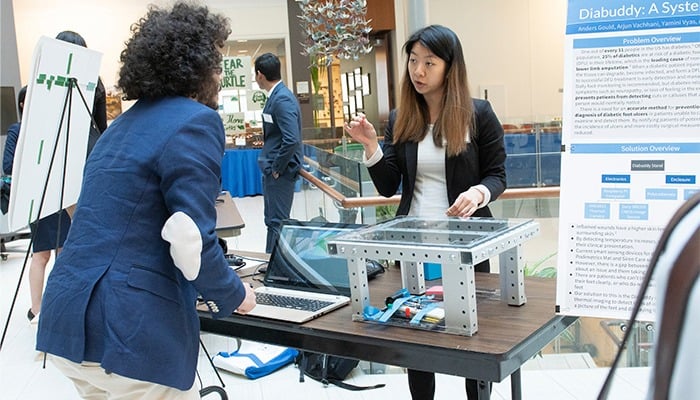Johns Hopkins BME offers several opportunities for undergraduate and graduate students to solve real medical and research challenges through team-based projects. Starting with a single team more than 20 years ago, our design programs have grown to include undergraduate, master’s, and advanced design teams, all focused on healthcare challenges. Our BME 2.0 curriculum also includes several project-based design courses focused on a variety of clinical and research topics.

The Undergraduate Design Team Program
Founded by Hopkins BME faculty in 1998, our Design Team program was the first in the nation to offer a longitudinal, team-based design course that incorporates freshmen through seniors. Each year, approximately 15 teams of Biomedical Engineering undergraduate students work with clinical or industry sponsors, faculty mentors, as well as professional designers, engineers, lawyers and researchers to address a real-world healthcare challenge. As they apply an iterative design approach to define and develop their functional prototypes and devices, Design Team students experience clinical immersion, have opportunities to work with industry experts and incorporate concepts related to intellectual property, regulatory frameworks, business plan development, and more. Since 2015, our undergraduates have generated:
- More than $800,000 in funding
- 11 provisional patent applications
- 19 journal and conference papers
- 6 new startup companies
- 60 awards—and counting
Learn about the BME Design Studio, a premiere workspace where students can design and develop solutions to clinical and global health challenges.
David E. Swirnow MSE in Bioengineering Innovation and Design (CBID)
Offered through the department’s Center for Bioengineering Innovation and Design (CBID), this program trains the next generation of leaders in healthcare innovation by guiding them to identify and create solution concepts for pressing challenges both here and globally, through an iterative process that includes detailed analysis, concept generation, prototyping, pre-clinical assessment and refinement, and commercialization planning. The program benefits from a rich clinical experience, robust industry partnerships, and a global immersion including international travel. Since it began in 2009, the CBID MSE program has resulted in:
- 84 advanced healthcare systems and global health projects
- Partnerships with 26 clinical departments and 180 project mentors
- 12 healthcare startup companies
- More than $25 million in equity investments and grants
- Multiyear partnerships with 10 leading medical device companies
- Support from leading global health funders, including USAID, BMGF, and Aspen Institute
Learn more about the CBID program.
Project-based Courses for Undergraduate and Graduate Students
Precision Care Medicine
Students apply machine learning and mechanistic and statistical modeling to develop data-driven solutions to healthcare problems that arise in anesthesiology and critical care medicine, including determining when patients should be admitted to or discharged from intensive care units, predicting changes in the state of patient health, and selecting optimal patient therapies. Teams work with faculty from the Johns Hopkins Institute for Computational Medicine and the departments of Anesthesiology & Critical Care Medicine, Neurology, and Psychiatry & Behavioral Sciences to design, validate, and deploy applications that deliver computational methods to address underlying healthcare problems.
Introduction to Rehabilitation Engineering
Students work in teams to develop new and improved needs-based devices to be used for measurement or treatment of an impairment or disability. In doing so, students learn the biomedical engineering design process and its application to those with disabilities.
Independent Design
Students work to design and evaluate a system that demonstrates creative thinking and experimental skills, and draws upon advanced topics of biomedical and traditional engineering.
Advanced Design
This course is the follow-up to our undergraduate Design Team course sequence. It provides project-specific mentorship and guidance for a team of students to complete a sophisticated prototype and demonstrate technical feasibility towards impacting a clinical problem. Allowing projects to continue as part of the curriculum beyond the first year of Design Team provides support for more advanced testing, de-risking, funding applications, and translation.
NeuroData Design
Students work in teams to build machine learning and statistical tools to answer neuroscientific questions. Working closely with neuroscientists, software developers, and data scientists, students develop open source algorithms and software. Teams work on applying their tools to real data, and submit manuscript drafts for future publication.
